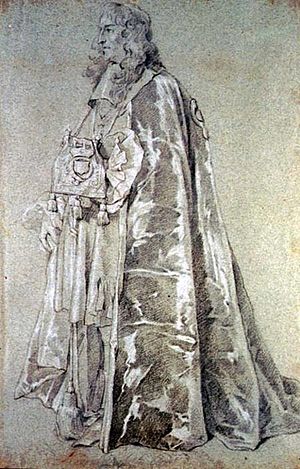Henry de Vic facts for kids
Sir Henry de Vic, 1st Baronet (born around 1599 – died November 20, 1671) was an important person from Guernsey. He worked closely with the royal family in England.
Contents
Early Life and Education
Sir Henry de Vic was born in Guernsey. His father was John de Vic. Henry went to school at Westminster School in London. Later, he studied at Christ Church, Oxford university. He earned his first degree, a Bachelor of Arts (BA), in 1619.
Working for the King
Serving Charles II
Sir Henry de Vic lived in Brussels for 20 years. During this time, he was the official representative for King Charles II. This meant he spoke for the King and handled important matters for him in Brussels.
Important Roles
In 1649, Sir Henry was given the title of Baronet. This was a special honor given by the King.
In 1660, he received two important jobs:
- He became the Secretary for the French Tongue. This role meant he was in charge of all official documents and communications written in French for the King.
- He was also made Chancellor of the Order of the Garter. The Order of the Garter is a very old and respected group of knights in England. The Chancellor helps manage the Order.
In 1662, Sir Henry became the Controller of the Household for the Duke of York. This meant he helped manage the Duke's home and staff. In the same year, he was chosen to be a Fellow of the Royal Society. This is a group of top scientists and thinkers.
Family Life
Sir Henry de Vic married Margaret Carteret. She was the daughter of Sir Philip Carteret from Saint Ouen, Jersey. Margaret also had a brother named Sir Philip Carteret, 1st Baronet.
Sir Henry and Margaret had two children:
- Their son, Sir Charles de Vic, inherited his father's title. However, Charles never married and had no children. Because of this, the special title of Baronet ended when he died.
- Their daughter, Anna Charlotte, married John Frescheville, 1st Baron Frescheville.
Death and Burial
Sir Henry de Vic passed away on November 20, 1671. He was buried in a famous church called Westminster Abbey in London. Many important people in British history are buried there.
 | Anna J. Cooper |
 | Mary McLeod Bethune |
 | Lillie Mae Bradford |


